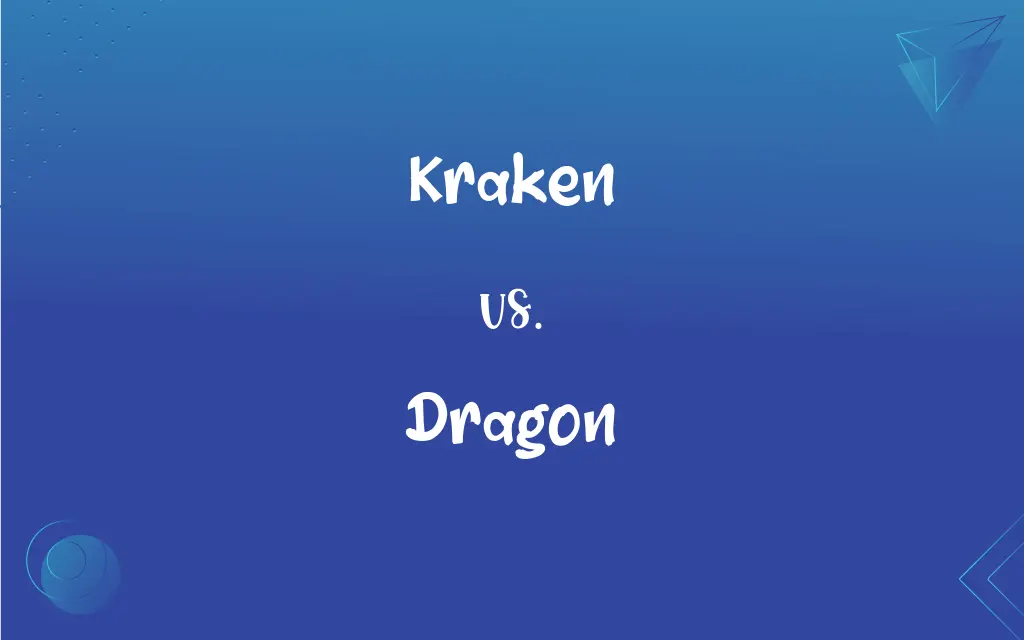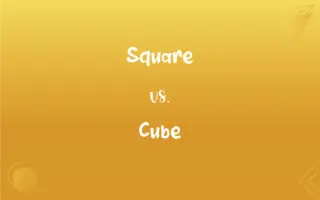Kraken vs. Dragon: What's the Difference?
Edited by Aimie Carlson || By Janet White || Updated on November 13, 2023
Kraken is a legendary sea monster resembling a giant octopus or squid, while a dragon is a mythical creature, often depicted as a large, serpentine, and winged beast, typically capable of breathing fire.

Key Differences
The kraken is a mythological sea creature, often described as a gigantic octopus or squid, emerging from the depths of the ocean. Dragons, conversely, are mythical creatures found in various cultures, typically portrayed as large, powerful, and often fire-breathing reptiles with wings.
Kraken tales are rooted in Nordic folklore, often associated with the dangers of the sea. Dragons, however, appear in a wide range of global mythologies, from European to Asian traditions, with varying characteristics and symbolism.
The kraken is notorious for dragging ships and sailors to the ocean's depths. Dragons are often depicted as guardians of treasures, possessors of wisdom, or destructive forces, depending on the culture.
In popular culture, the kraken is frequently represented as a monstrous, tentacled creature. Dragons are depicted in numerous forms, from fearsome beasts to wise, benevolent creatures, depending on the narrative.
The kraken's habitat is exclusively marine, representing the terror of the unexplored ocean. Dragons are more versatile, found in various environments, from mountaintops to caves and even celestial realms.
ADVERTISEMENT
Comparison Chart
Origin
Nordic folklore, sea monster.
Global mythologies, serpentine or reptilian.
Typical Representation
Giant octopus or squid with tentacles.
Winged, often fire-breathing, reptilian creature.
Symbolism
Terror of the sea, unknown maritime dangers.
Power, wisdom, or destruction, varying by culture.
Habitat
Deep ocean waters.
Diverse, including land, sea, and sky.
Role in Mythology
Menace to sailors and ships.
Guardians, wise beings, or villains.
ADVERTISEMENT
Kraken and Dragon Definitions
Kraken
A mythical creature of the deep, often in Nordic folklore.
The old tales spoke of a kraken that could pull whole ships underwater.
Dragon
A creature with magical abilities, often capable of breathing fire.
The dragon's breath could turn forests into ash.
Kraken
A legendary sea monster resembling a giant octopus or squid.
Sailors feared the kraken lurking in the foggy sea.
Dragon
A mythical creature often depicted as a large, serpentine being with wings.
The dragon soared above the castle, breathing fire.
Kraken
An iconic figure in sea lore and maritime legends.
Stories of the kraken have been told by seafarers for centuries.
Dragon
A symbol in various cultures, representing power, wisdom, or evil.
In Eastern mythology, the dragon is a symbol of wisdom and strength.
Kraken
A creature in modern media, often in fantasy and horror genres.
In the movie, the kraken emerged dramatically from the ocean depths.
Dragon
A common figure in fantasy literature and media.
The hero fought the dragon to rescue the kingdom.
Kraken
A representation of maritime peril and the unknown.
The kraken became a symbol of uncharted ocean territories.
Dragon
An emblematic animal in heraldry and folklore.
The family crest featured a dragon, symbolizing bravery and valor.
Kraken
A huge sea monster in Norwegian legend.
Dragon
See Draco2.
Kraken
A fabulous Scandinavian sea monster, often represented as resembling an island, but sometimes as resembling an immense octopus.
To believe all that has been said of the sea serpent or kraken, would be credulity; to reject the possibility of their existence, would be presumption.
Like a kraken huge and black.
Dragon
A mythical monster traditionally represented as a gigantic reptile having a long tail, sharp claws, scaly skin, and often wings.
Dragon
Any of various lizards, such as the Komodo dragon or the flying lizard.
FAQs
Is the kraken always hostile in legends?
Typically, but interpretations can vary.
Are krakens depicted in modern entertainment?
Yes, they appear in movies, books, and games.
Do dragons have a universal appearance?
No, their appearance varies significantly across cultures.
Is the kraken associated with any gods or deities?
Not typically; it's more of a sea monster in folklore.
Are dragons intelligent in myths?
Often, dragons are portrayed as highly intelligent beings.
Do dragons always breathe fire?
In many cultures, yes, but some dragons have other abilities.
Can dragons shape-shift?
In some myths, particularly Asian ones, dragons can change form.
Can dragons exist in different colors?
Yes, dragons are often depicted in various colors in mythology.
Are krakens real creatures?
No, they are mythical and not based on real animals.
Is the kraken part of ancient mythology?
It primarily appears in Norse and Scandinavian folklore.
Can dragons be benevolent?
Yes, especially in Eastern cultures, dragons are often wise and benevolent.
Was the kraken ever considered real by sailors?
In the past, some sailors believed in its existence.
Do dragons have a connection to the elements?
Yes, they're often connected to elemental forces like fire or water.
Do dragons have a specific habitat?
They're often found in mountains, caves, or mystical realms.
Are dragons part of religious beliefs?
In some cultures, dragons have religious or spiritual significance.
Are there different types of krakens in folklore?
Most tales describe a similar giant sea creature.
Do krakens have any symbolic meaning?
They often symbolize the fears and unknowns of the ocean.
Is there a famous story or movie featuring a kraken?
Yes, such as "Clash of the Titans" and "Pirates of the Caribbean."
Has the kraken appeared in literature?
Yes, in works like Jules Verne's "Twenty Thousand Leagues Under the Sea."
Are dragons usually friends or foes in stories?
It varies; in some tales, they're heroes, while in others, they're villains.
About Author
Written by
Janet WhiteJanet White has been an esteemed writer and blogger for Difference Wiki. Holding a Master's degree in Science and Medical Journalism from the prestigious Boston University, she has consistently demonstrated her expertise and passion for her field. When she's not immersed in her work, Janet relishes her time exercising, delving into a good book, and cherishing moments with friends and family.
Edited by
Aimie CarlsonAimie Carlson, holding a master's degree in English literature, is a fervent English language enthusiast. She lends her writing talents to Difference Wiki, a prominent website that specializes in comparisons, offering readers insightful analyses that both captivate and inform.































































